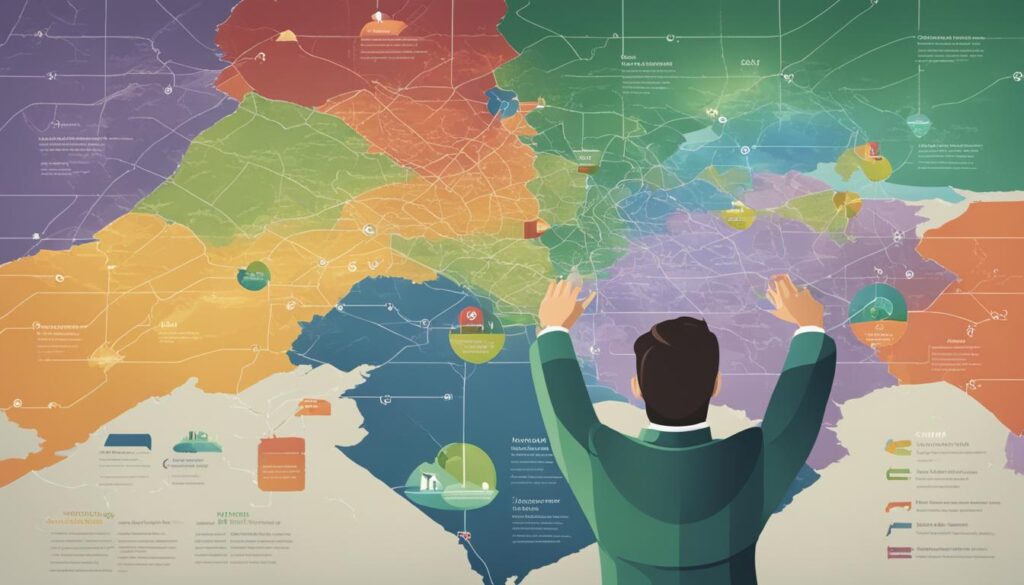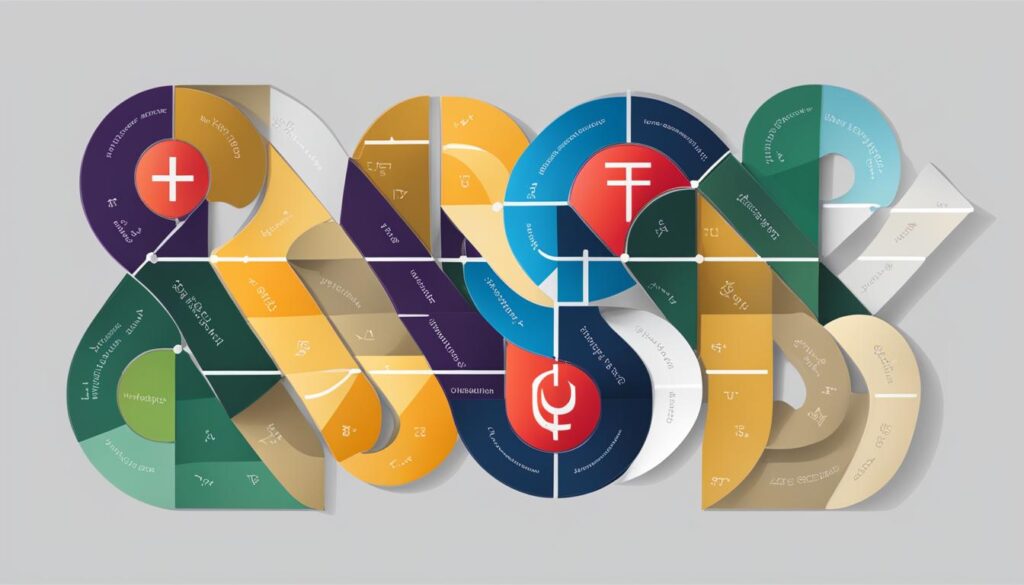Are you curious about your unique personality traits?
Do you want to better understand yourself and how you relate to others? Look no further than the Myers Briggs Personality Types. This widely recognized personality assessment, also known as MBTI, provides valuable insights into your individual preferences and tendencies.
Developed by Isabel Myers and Katharine Briggs, the Myers Briggs Personality Types assess an individual’s preferences on four dimensions of personality type: Introversion vs. Extraversion, Sensing vs. Intuition, Thinking vs. Feeling, and Judging vs. Perceiving. By identifying your preferred style on each dimension, you can discover your unique personality type.
Taking the Myers Briggs Personality Types test is easy and convenient. It consists of 130 questions and takes only 10-15 minutes to complete. Best of all, it’s free! Once you’ve completed the assessment, you can create an account on Truity.com to access your results and gain deeper insights into your personality.
Key Takeaways:
- The Myers Briggs Personality Types are based on four key dimensions of personality: Introversion vs. Extraversion, Sensing vs. Intuition, Thinking vs. Feeling, and Judging vs. Perceiving.
- The assessment consists of 130 questions and takes 10-15 minutes to complete.
- After taking the test, individuals can access their results by creating an account on Truity.com.
- Understanding your personality type can provide valuable insights into your preferences and tendencies.
- The Myers Briggs Personality Types assessment is widely recognized and considered accurate and insightful by most users.
Understanding Myers and Briggs’ Theory
The Myers Briggs Personality Types were created by Isabel Myers and Katharine Briggs, who based their work on the theories of psychologist Carl Jung. They proposed that there are four key dimensions that can be used to categorize people: Introversion vs. Extraversion, Sensing vs. Intuition, Thinking vs. Feeling, and Judging vs. Perceiving. Each dimension represents a dichotomy, and individuals can identify their preferred style on each dimension. These preferences combine to create a person’s personality type.
The Meaning of the Four Letters
Each of the four letters in a personality type code represents a preference in an individual’s style of thinking or behaving. The letters “I” or “E” stand for Introversion or Extraversion, “S” or “N” represent Sensing or Intuition, “T” or “F” represent Thinking or Feeling, and “J” or “P” stand for Judging or Perceiving.
These preferences play a significant role in shaping an individual’s approach to energy, information processing, decision-making, and structure. Understanding the meaning behind each letter can provide valuable insights into an individual’s personality classification, traits, and profiling.

Preferences and Their Significance
| Letter | Preference | Meaning |
|---|---|---|
| I | Introversion | Preference for inner reflection, focusing internally for energy |
| E | Extraversion | Preference for external stimulation, gaining energy from social interaction |
| S | Sensing | Preference for gathering information through the five senses and concrete facts |
| N | Intuition | Preference for interpreting information through patterns and possibilities |
| T | Thinking | Preference for making decisions based on logic and objective analysis |
| F | Feeling | Preference for making decisions based on personal values and empathy |
| J | Judging | Preference for structure, organization, and a planned approach |
| P | Perceiving | Preference for flexibility, adaptability, and a spontaneous approach |
Finding Your Personality Type
To discover your Myers Briggs Personality Type, you can take a free personality test that is based on Carl Jung’s and Isabel Briggs Myers’ typological approach to personality. The test will provide you with a 4-letter type formula and a description of your personality type, as well as information about communication and learning styles. It will also suggest suitable careers and occupations for your type. The test can be taken online and provides valuable insights into your own strengths and preferences.
Understanding your personality type can be enlightening and empowering. By discovering your unique traits and preferences, you gain a deeper understanding of yourself and how you interact with the world around you. Whether you are a natural-born leader, a creative thinker, or a practical problem solver, knowing your personality type can guide you in making choices that align with your strengths and passions.
The personality assessment questionnaire consists of a series of questions designed to uncover your preferences and tendencies. These questions explore various aspects of your personality, such as how you interact with others, how you gather information, how you make decisions, and how you organize your life. By answering these questions honestly and thoughtfully, you will receive an accurate assessment of your personality type.
Once you have completed the personality test, you will be assigned a 4-letter type formula that represents your personality type. This formula is composed of four different letters, each representing a different aspect of your personality. For example, an INFP personality type represents Introversion, Intuition, Feeling, and Perceiving.
In addition to the 4-letter type formula, you will also receive a detailed description of your personality type. This description will delve into the characteristics, strengths, and potential weaknesses associated with your type. It will offer insights into how you communicate, learn, and approach decision-making. This self-awareness can help you navigate relationships, choose a career path, and make important life decisions.
The personality assessment questionnaire also provides suggestions for suitable careers and occupations based on your personality type. By aligning your career choices with your natural strengths and preferences, you can find greater satisfaction and success in your professional life.
“Knowing yourself is the beginning of all wisdom.” – Aristotle
| Personality Type | Description | Career Suggestions |
|---|---|---|
| ISTJ | Introverted, Sensing, Thinking, Judging | Accountant, Project Manager, Logistician |
| ENFP | Extraverted, Intuition, Feeling, Perceiving | Journalist, Counselor, Entrepreneur |
| ISFP | Introverted, Sensing, Feeling, Perceiving | Artist, Social Worker, Yoga Instructor |
| ENTJ | Extraverted, Intuition, Thinking, Judging | CEO, Lawyer, Entrepreneur |
| INTP | Introverted, Intuition, Thinking, Perceiving | Software Developer, Architect, Engineer |
Remember, your personality type is not a rigid label but a framework for understanding yourself better. It serves as a guide to help you navigate your personal and professional life, but it doesn’t define who you are as a person. Embrace your unique qualities, and use your knowledge of your personality type to make choices that align with your true self.
Applying Your Personality Type
Once you know your personality type, you can leverage this valuable knowledge to make decisions that align with your true nature. The test provides insights into careers and occupations that are most suitable for your type. Additionally, it offers examples of educational institutions where you can further develop your skills and thrive.
Understanding your own strengths and tendencies empowers you to make choices that lead to personal and professional growth. By pursuing a career that complements your personality type, you can find fulfillment and satisfaction in your work. Likewise, choosing educational institutions that support your learning style and values can enhance your skills and broaden your horizons.
Examples of Careers for Different Personality Types:
| Personality Type | Career Suggestions |
|---|---|
| ESTJ | Business Administrator, Project Manager, Attorney |
| INFP | Writer, Counselor, Graphic Designer |
| ENTJ | CEO, Lawyer, Entrepreneur |
| ISFP | Artist, Interior Designer, Physical Therapist |
These are just a few examples to give you an idea of the wide range of careers available for different personality types. It’s crucial to consider your own interests, values, and strengths when exploring career paths.
Examples of Educational Institutions for Different Personality Types:
- ISTJ: University of Chicago, Harvard University, Stanford University
- ENFP: New York University, University of California, Los Angeles, University of Miami
- INTJ: Massachusetts Institute of Technology, California Institute of Technology, University of Cambridge
- ESFJ: University of Notre Dame, University of Texas at Austin, University of Michigan
These are just a few examples of educational institutions that may resonate with different personality types. It’s essential to explore and research institutions that align with your academic goals, learning style, and overall preferences.
By capitalizing on your unique personality type, you can pursue a career and education that truly suits you, leading to personal fulfillment and success.

Famous Personalities with Similar Types
Your personality type may have similarities with well-known individuals. Discovering which famous personalities share your type can provide a sense of connection and understanding. It can be incredibly inspiring and guiding as you navigate both your personal and professional life.
When you find famous personalities with similar types, it allows you to see that your traits are not only unique to you but also shared by others who have made significant contributions in various fields. This realization can motivate you to embrace your strengths and embrace the potential within yourself.
By learning about the famous personalities who share your type, you can gain insights into how they have utilized their specific characteristics to achieve success. Their stories and experiences can serve as a source of inspiration and guidance as you pursue your own goals and aspirations.
Below is a list of famous individuals who share each personality type:
| Personality Type | Famous Personalities |
|---|---|
| INTJ | Elon Musk, Mark Zuckerberg, Nikola Tesla |
| ENFP | Oprah Winfrey, Walt Disney, Robin Williams |
| ISTJ | Queen Elizabeth II, George Washington, Warren Buffett |
| ESFP | Will Smith, Jennifer Lopez, Marilyn Monroe |

Discovering famous personalities who share your type not only helps you feel connected to a larger community but also allows you to see that your personality traits can contribute to your success. Remember, these individuals have made a significant impact on the world, and by embracing your own unique qualities, you too can create your own path to achievement and fulfillment.
Personal and Professional Development
Understanding your personality type is crucial for personal and professional development. The Myers Briggs Personality Type test provides valuable insights into behavior under stress, leadership style, and communication strategies for different types. By utilizing this knowledge, individuals can enhance their relationships and personal growth.

When faced with challenging situations, individuals with different personality types tend to exhibit varying behaviors. Some may become more introverted and reflective, while others may become more assertive and action-oriented. By understanding your own behavior under stress, you can learn to manage it more effectively and develop strategies to cope with challenging situations.
| Personality Type | Behavior under Stress |
|---|---|
| ENTJ | Becomes more assertive and focused on problem-solving |
| ISFP | Withdraws and seeks solitude to process emotions |
| ENFP | Becomes overwhelmed and may struggle with decision-making |
| ISTJ | Becomes more rigid and rule-oriented |
Effective leadership requires an understanding of your own leadership style and how it aligns with the needs and preferences of your team. The Myers Briggs test provides insights into different leadership styles based on personality types. By identifying your natural leadership style, you can leverage your strengths and adapt your approach to effectively lead and motivate your team.
Long-term compatibility is a vital aspect of personal relationships. The Myers Briggs test suggests using the Jung Marriage Test™ to assess long-term compatibility with a romantic partner. By understanding your compatibility based on personality types, you can navigate relationship challenges and build a more harmonious and fulfilling partnership.
Peter’s Leadership Style Based on Myers Briggs Personality Type:
| Personality Type | Leadership Style |
|---|---|
| ENFJ | Charismatic and empathetic, focuses on creating harmony within the team |
By leveraging the insights gained from understanding your personality type, you can develop strategies to enhance your personal and professional growth. Whether it’s managing stress, refining your leadership style, or seeking compatible relationships, the Myers Briggs test empowers individuals to make informed decisions and embrace their true nature.
Differences Between MBTI® and TypeFinder®
While both the MBTI® assessment and the TypeFinder® are based on the theory developed by Myers and Briggs, there are some key differences between the two. The MBTI® assessment is the original assessment developed by Isabel Briggs Myers and has more limited availability and a cost associated with it. The TypeFinder®, on the other hand, is developed by Truity and is available online for free, with the option to purchase an expanded report. Both assessments measure preferences on personality dimensions but have variations in details and pricing.

| MBTI® | TypeFinder® |
|---|---|
| Developed by Isabel Briggs Myers | Developed by Truity |
| Limited availability and associated cost | Available online for free, with options to purchase an expanded report |
| Provides insights into personality dimensions | Measures preferences on personality dimensions |
| Comprehensive assessment with in-depth information | Provides a concise assessment with customizable options |
Privacy and Data Security
At Truity, we prioritize data privacy and security. We understand the importance of protecting your personal information and ensuring a safe online experience. That’s why we have implemented stringent measures to safeguard your data at all times.
Rest assured that we do not sell any personal data, including email addresses, to third parties. We value your trust and are committed to keeping your information confidential.
We comply with all applicable privacy laws to guarantee the highest level of data protection. Our privacy policy outlines our commitment to transparency and provides detailed information about how we handle and secure your data. You can find our privacy policy on our website to learn more about the measures we have in place.
In addition, we have a zero-spam policy, ensuring that you will not receive any unwanted emails or communications from us. We respect your inbox and will only send you relevant and valuable content.
At Truity, your privacy and peace of mind are of utmost importance to us. Trust us to handle your data with the utmost care and protection.

Conclusion
Discovering your Myers Briggs Personality Type can be a valuable tool for personal and professional growth. By understanding your preferences and tendencies, you can make choices that align with your true nature and lead to greater fulfillment.
The Myers Briggs Personality Type test provides insights into communication styles, learning preferences, and suitable careers, allowing you to make informed decisions about your personal and professional development. Whether you’re seeking to enhance your relationships, improve your leadership skills, or explore new career opportunities, understanding your personality type can guide you towards success.
Start your journey today and unlock the secrets to your personal and professional growth. Embrace your unique qualities and leverage them to reach your full potential. With the knowledge gained from the Myers Briggs Personality Type test, you can navigate life’s challenges with confidence, make meaningful connections with others, and create a fulfilling and purposeful life.
FAQ
What is the Myers Briggs Personality Types assessment?
The Myers Briggs Personality Types assessment measures an individual’s preferences on four dimensions of personality type.
How long does the test take to complete?
The test takes about 10-15 minutes to complete.
Is the test free?
Yes, the test is free, but a more comprehensive full report can be purchased.
How accurate are the results of the test?
The results of this test are considered accurate and insightful by most users.
How can I access my test results?
After taking the test, individuals can access their results by creating an account on Truity.com.
What are the four dimensions of personality type?
The four dimensions are Introversion vs. Extraversion, Sensing vs. Intuition, Thinking vs. Feeling, and Judging vs. Perceiving.
What do the letters in the personality type code represent?
Each letter represents a preference in an individual’s style of thinking or behaving. “I” or “E” represents Introversion or Extraversion, “S” or “N” represents Sensing or Intuition, “T” or “F” represents Thinking or Feeling, and “J” or “P” represents Judging or Perceiving.
How can I use my personality type in personal and professional development?
Understanding your personality type can help you make decisions that align with your true nature and lead to personal and professional growth.
Are there famous personalities with the same personality types?
Yes, the test can show you which famous personalities share your type.
What are the differences between MBTI® and TypeFinder®?
While both assessments are based on the theory developed by Myers and Briggs, there are some key differences between the two in terms of availability and pricing.
How does Truity ensure privacy and data security?
Truity takes privacy and data security seriously. They do not sell personal data to third parties and comply with applicable privacy laws. They have a zero-spam policy.

